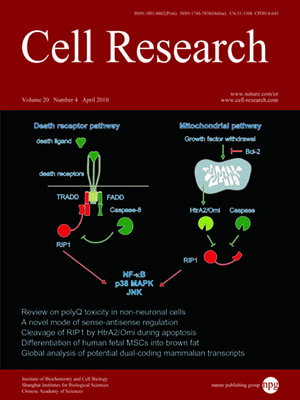
Volume 20, No 4, Apr 2010
ISSN: 1001-0602
EISSN: 1748-7838 2018
impact factor 17.848*
(Clarivate Analytics, 2019)
Volume 20 Issue 4, April 2010: 408-420
ORIGINAL ARTICLES
A de novo originated gene depresses budding yeast mating pathway and is repressed by the protein encoded by its antisense strand
Dan Li1,2,*, Yang Dong1,2,*, Yu Jiang1,2,*, Huifeng Jiang1,3,*, Jing Cai1,2 and Wen Wang1
1CAS-Max Planck Junior Research Group, State Key Laboratory of Genetic Resources and Evolution, Kunming Institute of Zoology, Chinese Academy of Sciences (CAS), Kunming, Yunnan 650223, China
2Graduate School of Chinese Academy Sciences, Beijing 100039, China
3Present address: Division of Nutritional Sciences, Cornell University, Ithaca, NY 14853, USA
Correspondence: Wen Wang,(wwang@mail.kiz.ac.cn)
Recent transcription profiling studies have revealed an unexpectedly large proportion of antisense transcripts in eukaryotic genomes. These antisense genes seem to regulate gene expression by interacting with sense genes. Previous studies have focused on the non-coding antisense genes, but the possible regulatory role of the antisense protein is poorly understood. In this study, we found that a protein encoded by the antisense gene
ADF1 acts as a transcription suppressor, regulating the expression of sense gene
MDF1 in
Saccharomyces cerevisiae. Based on the evolutionary, genetic, cytological and biochemical evidence, we show that the protein-coding sense gene
MDF1 most likely originated
de novo from a previously non-coding sequence and can significantly suppress the mating efficiency of baker's yeast in rich medium by binding MATα2 and thus promote vegetative growth. These results shed new light on several important issues, including a new sense-antisense interaction mechanism, the
de novo origination of a functional gene, and the regulation of yeast mating pathway.
Cell Research (2010) 20:408-420. doi: 10.1038/cr.2010.31; published online 2 March 2010
FULL TEXT | PDF
Browse 2415


